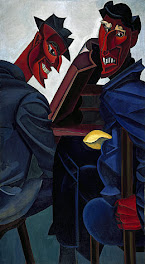Origins of the word "value"
c.1300, from Anglo-Fr. and O.Fr. valliant "stalwart, brave," from prp. of valoir "be worthy," originally "be strong," from L. valere "be strong, be well, be worth, have power, be able," from PIE base *wal- "be strong" (cf. O.E. wealdan "to rule," O.H.G. -walt, -wald "power" (in personal names), O.N. valdr "ruler," O.C.S. vlasti "to rule over," Lith. valdyti "to have power," Celt. *walos- "ruler," O.Ir. flaith "dominion,"
1570s, "having force in law, legally binding," from M.Fr. valide, from L. validus "strong, effective," from valere "be strong" (see valiant). The meaning "supported by facts or authority" is first recorded 1640s.
Worth
from P.Gmc. *werthaz “toward, opposite,” hence “equivalent, worth" (cf. O.Fris. werth, O.N. verðr, Du. waard, O.H.G. werd, Ger. wert, Goth. wairþs "worth, worthy"), perhaps a derivative of PIE *wert- "to turn, wind," from base *wer- "to turn, bend" (see versus). O.C.S. vredu, Lith. vertas "worth" are Gmc. loan-words. Worthless is first attested 1588; worthwhile is recorded from 1884.
worth (2) Look up worth at Dictionary.com
"to come to be," now chiefly, if not solely, in the archaic expression woe worth the day, present subjunctive of O.E. weorðan "to become, be, to befall," from P.Gmc. *werthan "to become" (cf. O.S., O.Du. werthan, O.N. verða, O.Fris. wertha, O.H.G. werdan, Ger. werden, Goth. wairþan "to become"), lit. "to turn into," from P.Gmc. *werthaz “toward, opposite,” perhaps a derivative of PIE *wert- "to turn, wind," from base *wer- "to turn, bend" (see versus).
+-+1920-21+A+Reading+of+Ovid+(Tyros).jpeg)



No comments:
Post a Comment